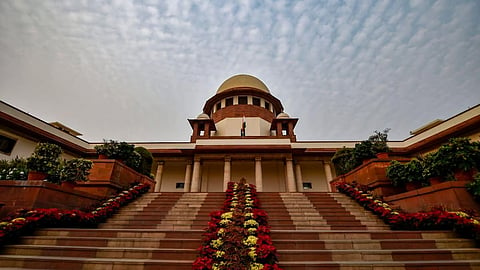

NEW DELHI: The Supreme Court on Tuesday raised concerns over the delay in carrying out the delimitation exercise in Arunachal Pradesh, Nagaland, Manipur and Assam, despite a 2020 presidential order rescinding the deferment of the process.
A bench comprising Chief Justice Sanjiv Khanna and Justice Sanjay Kumar said "once the president rescinds the notification, that is enough" to proceed with the delimitation exercise.
"Where does the government come in?" The bench asked Additional Solicitor General K M Natraj, appearing for the Centre, to take instructions on the future course of action on the matter.
"Take instructions on this, the exercise has to be done, it is a statutory mandate and therefore you have to comply with it," the CJI said.
The additional solicitor general said while consultations are underway for Arunachal Pradesh and Nagaland, the ongoing violence in Manipur makes the situation there unconducive.
The hearing on a plea filed by 'Delimitation Demand Committee for the State of Arunachal Pradesh, Assam, Manipur & Nagaland in North East India' was then deferred till January 2025.
The plea seeks immediate implementation of the delimitation exercise in these northeastern states.
Advocate G Gangmei, appearing for the petitioner, said the president's 2020 order made the exercise legally mandatory.
He pointed out that two years have passed since the writ petition was filed, yet no concrete steps have been taken to initiate delimitation in Arunachal Pradesh, Nagaland, and Manipur.
He added that Assam alone has seen progress, with delimitation completed in August 2023 following an order from the Ministry of Law and Justice.
The Election Commission (EC), represented by senior advocate Maninder Singh, maintained that specific directions from the central government are required to begin delimitation under Section 8A of the Representation of the People Act, 1950.
The advocate said in Assam's case, such government instructions had been issued, enabling the EC to proceed.
However, the bench highlighted that once the president rescinds a deferment notification, the EC is bound to conduct the delimitation exercise without waiting for further government intervention.
The EC's counsel also noted that the sensitive nature of the northeastern states requires a cautious approach to avoid exacerbating tensions.
The bench, however, dismissed the need to club all four states together, pointing out that Nagaland and Arunachal Pradesh have not faced any adverse security issues recently.
The court emphasised the statutory mandate to conduct delimitation and directed the government to provide clear instructions for the way forward.
The petition cited the presidential order of February 28, 2020, which allowed delimitation in the four northeastern states, along with the Union Territory of Jammu and Kashmir.
It alleged selective denial of delimitation in these states, claiming a violation of the fundamental right to equality under Article 14 of the Constitution.
The plea highlighted that despite decades of elections being conducted peacefully in these states, no delimitation has occurred since the amendment of the Delimitation Act in 2002.
The plea said this lack of action has left the northeastern states at a disadvantage compared to the rest of India.